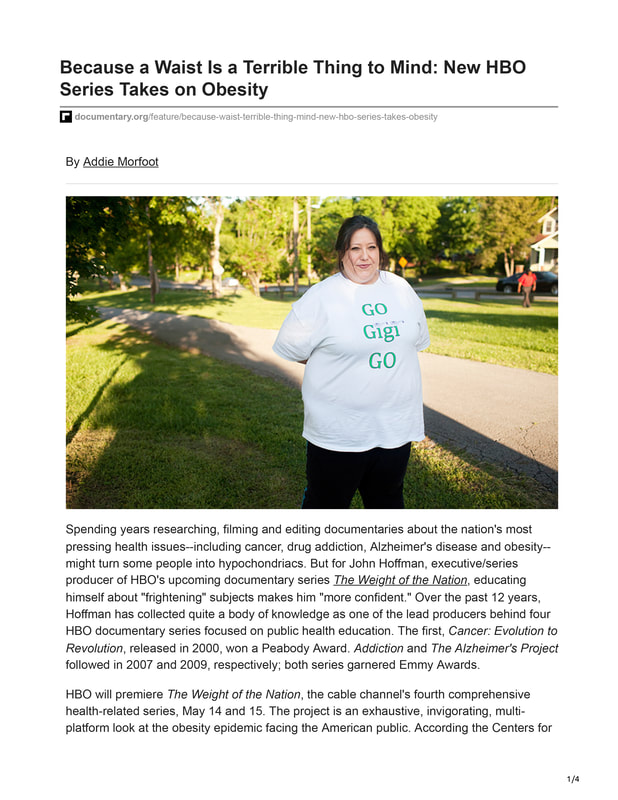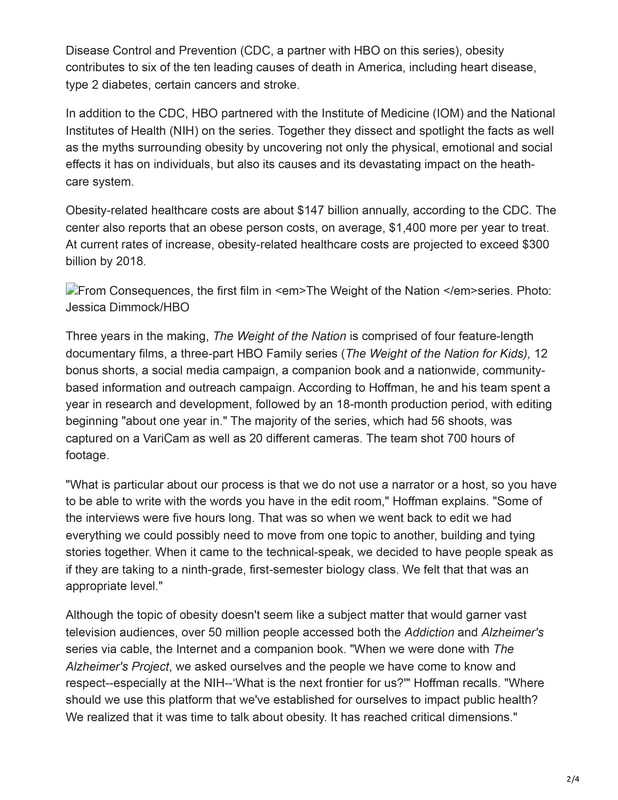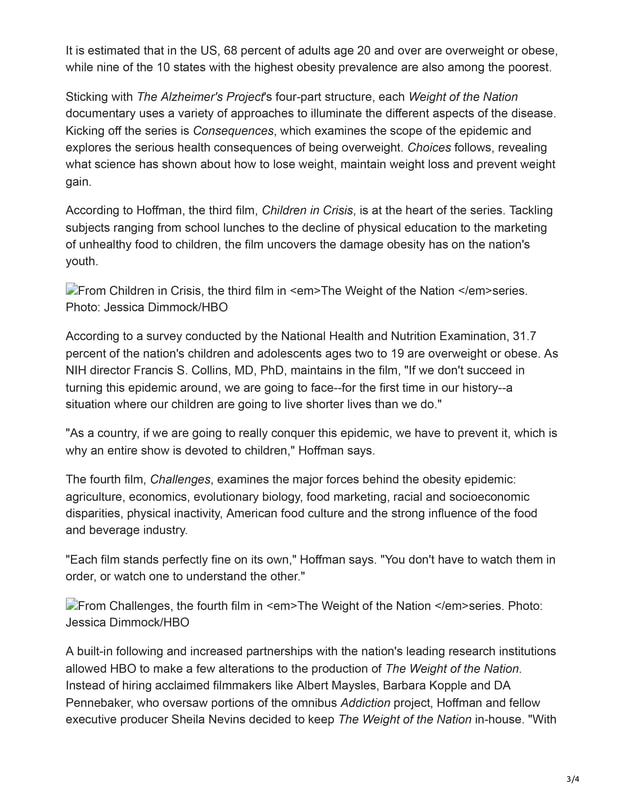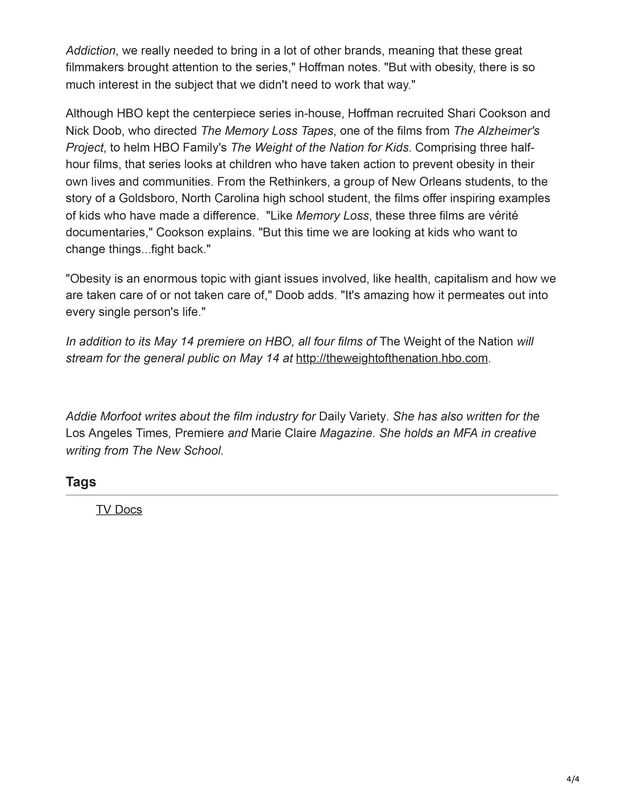|
Because a Waist Is a Terrible Thing to Mind: New HBO Series Takes on ObesityBY ADDIE MORFOOT
Spending years researching, filming and editing documentaries about the nation's most pressing health issues--including cancer, drug addiction, Alzheimer's disease and obesity--might turn some people into hypochondriacs. But for John Hoffman, executive/series producer of HBO's upcoming documentary series The Weight of the Nation, educating himself about "frightening" subjects makes him "more confident." Over the past 12 years, Hoffman has collected quite a body of knowledge as one of the lead producers behind four HBO documentary series focused on public health education. The first, Cancer: Evolution to Revolution, released in 2000, won a Peabody Award. Addiction and The Alzheimer's Project followed in 2007 and 2009, respectively; both series garnered Emmy Awards. HBO will premiere The Weight of the Nation, the cable channel's fourth comprehensive health-related series, May 14 and 15. The project is an exhaustive, invigorating, multi-platform look at the obesity epidemic facing the American public. According the Centers for Disease Control and Prevention (CDC, a partner with HBO on this series), obesity contributes to six of the ten leading causes of death in America, including heart disease, type 2 diabetes, certain cancers and stroke. In addition to the CDC, HBO partnered with the Institute of Medicine (IOM) and the National Institutes of Health (NIH) on the series. Together they dissect and spotlight the facts as well as the myths surrounding obesity by uncovering not only the physical, emotional and social effects it has on individuals, but also its causes and its devastating impact on the heath-care system. Obesity-related healthcare costs are about $147 billion annually, according to the CDC. The center also reports that an obese person costs, on average, $1,400 more per year to treat. At current rates of increase, obesity-related healthcare costs are projected to exceed $300 billion by 2018. Three years in the making, The Weight of the Nation is comprised of four feature-length documentary films, a three-part HBO Family series (The Weight of the Nation for Kids), 12 bonus shorts, a social media campaign, a companion book and a nationwide, community-based information and outreach campaign. According to Hoffman, he and his team spent a year in research and development, followed by an 18-month production period, with editing beginning "about one year in." The majority of the series, which had 56 shoots, was captured on a VariCam as well as 20 different cameras. The team shot 700 hours of footage. "What is particular about our process is that we do not use a narrator or a host, so you have to be able to write with the words you have in the edit room," Hoffman explains. "Some of the interviews were five hours long. That was so when we went back to edit we had everything we could possibly need to move from one topic to another, building and tying stories together. When it came to the technical-speak, we decided to have people speak as if they are taking to a ninth-grade, first-semester biology class. We felt that that was an appropriate level." Although the topic of obesity doesn't seem like a subject matter that would garner vast television audiences, over 50 million people accessed both the Addiction and Alzheimer's series via cable, the Internet and a companion book. "When we were done with The Alzheimer's Project, we asked ourselves and the people we have come to know and respect--especially at the NIH--‘What is the next frontier for us?'" Hoffman recalls. "Where should we use this platform that we've established for ourselves to impact public health? We realized that it was time to talk about obesity. It has reached critical dimensions." It is estimated that in the US, 68 percent of adults age 20 and over are overweight or obese, while nine of the 10 states with the highest obesity prevalence are also among the poorest. Sticking with The Alzheimer's Project's four-part structure, each Weight of the Nation documentary uses a variety of approaches to illuminate the different aspects of the disease. Kicking off the series is Consequences, which examines the scope of the epidemic and explores the serious health consequences of being overweight. Choices follows, revealing what science has shown about how to lose weight, maintain weight loss and prevent weight gain. According to Hoffman, the third film, Children in Crisis, is at the heart of the series. Tackling subjects ranging from school lunches to the decline of physical education to the marketing of unhealthy food to children, the film uncovers the damage obesity has on the nation's youth. According to a survey conducted by the National Health and Nutrition Examination, 31.7 percent of the nation's children and adolescents ages two to 19 are overweight or obese. As NIH director Francis S. Collins, MD, PhD, maintains in the film, "If we don't succeed in turning this epidemic around, we are going to face--for the first time in our history--a situation where our children are going to live shorter lives than we do." "As a country, if we are going to really conquer this epidemic, we have to prevent it, which is why an entire show is devoted to children," Hoffman says. The fourth film, Challenges, examines the major forces behind the obesity epidemic: agriculture, economics, evolutionary biology, food marketing, racial and socioeconomic disparities, physical inactivity, American food culture and the strong influence of the food and beverage industry. "Each film stands perfectly fine on its own," Hoffman says. "You don't have to watch them in order, or watch one to understand the other." A built-in following and increased partnerships with the nation's leading research institutions allowed HBO to make a few alterations to the production of The Weight of the Nation. Instead of hiring acclaimed filmmakers like Albert Maysles, Barbara Kopple and DA Pennebaker, who oversaw portions of the omnibus Addiction project, Hoffman and fellow executive producer Sheila Nevins decided to keep The Weight of the Nation in-house. "With Addiction, we really needed to bring in a lot of other brands, meaning that these great filmmakers brought attention to the series," Hoffman notes. "But with obesity, there is so much interest in the subject that we didn't need to work that way." Although HBO kept the centerpiece series in-house, Hoffman recruited Shari Cookson and Nick Doob, who directed The Memory Loss Tapes, one of the films from The Alzheimer's Project, to helm HBO Family's The Weight of the Nation for Kids. Comprising three half-hour films, that series looks at children who have taken action to prevent obesity in their own lives and communities. From the Rethinkers, a group of New Orleans students, to the story of a Goldsboro, North Carolina high school student, the films offer inspiring examples of kids who have made a difference. "Like Memory Loss, these three films are vérité documentaries," Cookson explains. "But this time we are looking at kids who want to change things...fight back." "Obesity is an enormous topic with giant issues involved, like health, capitalism and how we are taken care of or not taken care of," Doob adds. "It's amazing how it permeates out into every single person's life." In addition to its May 14 premiere on HBO, all four films of The Weight of the Nation will stream for the general public on May 14 at http://theweightofthenation.hbo.com. Addie Morfoot writes about the film industry for Daily Variety. She has also written for the Los Angeles Times, Premiere and Marie Claire Magazine. She holds an MFA in creative writing from The New School. IDA Magazine International Documentary Associate
0 Comments
Leave a Reply. |





 RSS Feed
RSS Feed